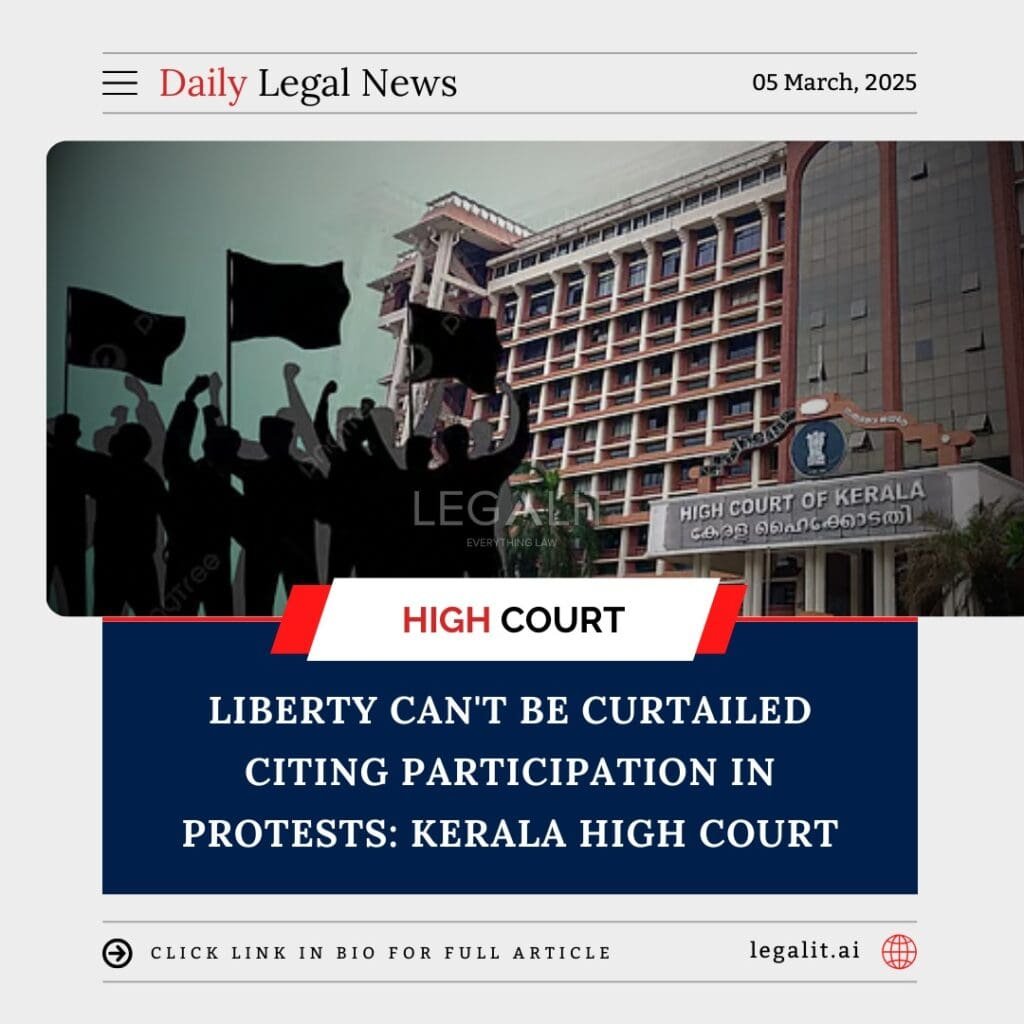
Background
The Kerala High Court, in a significant ruling, reaffirmed that mere participation in a protest cannot be used as a reason to restrict a person’s liberty. The case involved an individual who had been arrested for taking part in a political demonstration and was subsequently denied bail. The authorities contended that the protest had disrupted public order and, therefore, warranted legal action against the participants. However, the petitioner argued that their fundamental rights under the Constitution were being violated and that there was no specific evidence linking them to any illegal act or violence during the protest.
The issue of restricting liberty based on protest participation has been a recurring debate in India, where law enforcement agencies often invoke provisions of the Indian Penal Code (IPC) and special laws to justify arrests. While authorities argue that maintaining public order is a necessity, courts have frequently intervened to ensure that constitutional freedoms are not arbitrarily curtailed. This case once again brought into focus the tension between individual rights and state-imposed restrictions.
Court’s Rationale
The Kerala High Court, while delivering its judgment, made it clear that participation in protests is an essential part of a democratic society and cannot be treated as a criminal act in itself. The court observed that the right to protest is enshrined in the Indian Constitution, particularly under Article 19, which guarantees freedom of speech and expression, as well as the right to assemble peacefully. Any attempt to suppress these rights without justifiable cause would amount to a violation of constitutional principles.
The court also pointed out that authorities must make a clear distinction between individuals who are peacefully protesting and those engaging in unlawful activities such as rioting, destruction of public property, or violence. If an individual has not committed any specific offense, their mere presence at a protest cannot be used as a basis for detention or legal action. The ruling emphasized that state authorities cannot invoke general allegations of public disorder to justify broad restrictions on personal liberty.
Furthermore, the court noted that in several previous cases, the judiciary had intervened to prevent the misuse of laws that restrict protests. It referred to Supreme Court judgments that have upheld the right to dissent, stating that in a democracy, peaceful demonstrations play a crucial role in holding governments accountable. The Kerala High Court stressed that law enforcement agencies should act with caution and must not arbitrarily use the law to silence dissenting voices.
Existing Measures
The Indian legal system recognizes the right to peaceful protest, but authorities often impose restrictions under various provisions of the law. One of the most commonly invoked provisions is Section 144 of the Code of Criminal Procedure (CrPC), which allows magistrates to prohibit gatherings if there is an apprehension of public disorder. While this provision is meant to be used in exceptional circumstances, it has frequently been imposed to curb protests, sometimes leading to allegations of misuse.
Additionally, stringent laws such as the Unlawful Activities (Prevention) Act (UAPA) have been invoked against protestors, particularly in politically sensitive cases. This law provides sweeping powers to authorities to arrest individuals based on suspicion of involvement in activities deemed to be against national security. However, courts have repeatedly emphasized that such provisions should be used judiciously and not as a tool to suppress lawful dissent.
In recent years, the Supreme Court has ruled in favor of protecting citizens’ rights in several landmark cases related to protests. For instance, in the Shaheen Bagh protest case, the court acknowledged that while there is a need to balance law and order, citizens’ right to protest in public spaces cannot be completely denied. Similarly, in cases related to farmers’ protests, the judiciary has taken a cautious approach, ensuring that fundamental rights are not eroded in the name of maintaining public order.
Conclusion
The Kerala High Court’s ruling serves as yet another reminder that participation in protests, in itself, cannot be criminalized. It reinforces the idea that in a functioning democracy, citizens have the right to express dissent without the fear of arbitrary detention. The judgment also sends a strong message to law enforcement agencies, urging them to respect constitutional principles and avoid suppressing legitimate protests through excessive legal action.
This case highlights the continuing need for judicial oversight to prevent the misuse of laws that could curtail fundamental rights. The court’s intervention ensures that state authorities remain accountable and do not resort to indiscriminate actions against individuals merely exercising their democratic rights. With increasing concerns over restrictions on free speech and assembly, such rulings play a crucial role in maintaining the balance between state power and individual freedoms.